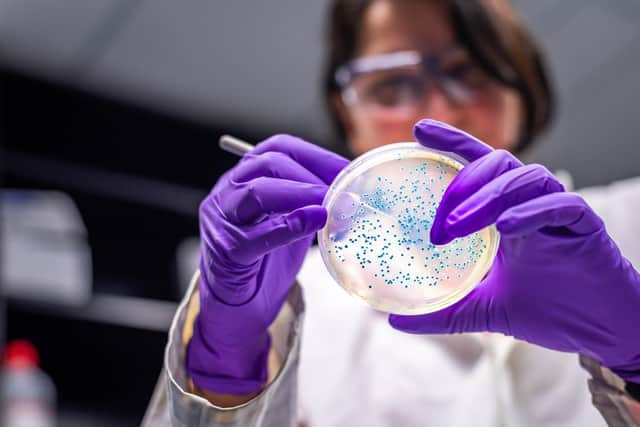Why E.coli cases are proportionally higher in Scotland than England and when the outbreak could end
The UK is in the midst of an E. coli outbreak, with Scotland and Wales being disproportionately affected compared to England.
The latest data from the UK’s Health Security Agency (UKHSA) shows that as of 11 June, there have been 211 confirmed cases of STEC O145 - the designation given to this particular strain of E. coli.
Advertisement
Hide AdAdvertisement
Hide AdThere have been 147 confirmed cases in England, 27 in Wales, and 35 in Scotland, despite Scotland having roughly one-tenth the population of England.


Around half of the confirmed cases have resulted in hospitalisation, which has prompted experts to warn the strain is particularly virulent, although there have been no reported deaths. The largest outbreak of E. coli in the UK, in Lanarkshire in 1996, claimed the lives of 21 people.
The UK’s Food Standards Agency (FSA) and Food Standards Scotland (FSS) have issued recall notices for 60 products associated with suppliers Greencore, which supplies supermarkets including Asda, Morrisons and Sainsbury’s, and Samworth Brothers Manton Wood, which supplies Tesco and One Stop.
The contaminated products appear to be the salad components of supermarket sandwiches.
Darren Whitby, head of incidents at the FSA, said: “This is a complex investigation, and we have worked swiftly with the relevant businesses and the local authorities concerned to narrow down the wide range of foods consumed to a small number of salad leaf products that have been used in sandwiches, wraps, subs and rolls.


“Following thorough food chain analysis, these products are being recalled as a precaution.
“Infections caused by STEC [Shiga toxin-producing Escherichia coli] bacteria can cause severe bloody diarrhoea and, in some cases, more serious complications.
“We therefore advise any consumers who have any of these products not to eat them.”
Why does Scotland appear to be disproportionately affected?
Advertisement
Hide AdAdvertisement
Hide AdAccording to the University of Glasgow’s Professor Andrew Roe, Scotland could appear to be more affected by the UK’s E. coli outbreak due to high levels of vigilance caused by previous outbreaks.
“The biggest outbreak in the UK was in Lanarkshire in 1996, which affected 345 people,” said Prof Roe, who leads a research team on e. coli.
“So it could be because Scotland is a hotspot for O157, a different strain of E. coli to the current outbreak, which has led to high vigilance of the infection.
“The diagnostics here are quite well set up, and we’re quite aware of it as a disease.
“It could be good diagnosis, or it could be consumer habits, such as sandwiches, more of which could have ended up in Scotland.”
How long can we expect the outbreak to last for?
The data from the outbreak in 1996 shows the first confirmed cases were found on 15 November and the last confirmed cases were on 15 December.
“In this outbreak, it started at the end of May, but there’s been some difficulty in finding the source - in this case the sandwiches,” said Prof Roe.
“So another two or three weeks I would think, it’s probably peaking now, and will go back down over time.
Advertisement
Hide AdAdvertisement
Hide Ad“People are aware of it now, so will be avoiding these sandwiches.”
Is it safe to eat supermarket sandwiches?
“There are many components to supermarket sandwiches, meat, eggs, fish, salad, etc, so fundamentally there’s nothing wrong with eating supermarket sandwiches,” said Prof Roe. “But the challenge is that we’ve noticed there’s been more outbreaks with salad-type sandwiches.
“It’s not food which gets cooked, so if it is infected, it’s quite difficult to stop, there’s not much you can do in terms of food hygiene.
“0157 (the bug most commonly found in Scotland) was originally known as ‘the burger bug’; most E. coli lives in cattle and humans, so it is associated with meat.
“The problem with salads, and the way they get contaminated, is that animals live on farms, they defecate onto the soil, which contaminates salad produce.
“The E. coli can live on the leaves, but also enter the actual organism. It’s an animal source initially, which then can enter the food chain.”
What are the symptoms of E. coli infection?
E. coli infection is not serious in most people, but the current strain has caused an unusually high number of hospitalisations. Of the 160 infections investigated by UKHSA, 42 per cent resulted in hospitalisation.
Infections caused by STEC bacteria are often transmitted by eating contaminated food but can also be spread by close contact with an infected person, as well as direct contact with an infected animal or its environment.
Advertisement
Hide AdAdvertisement
Hide AdTrish Mannes, incident director at UKHSA, said: “Symptoms of infections with STEC include severe and sometimes bloody diarrhoea, stomach cramps, vomiting and fever.
“If you are unwell, have eaten salad leaves recently and are concerned about any symptoms, follow NHS.uk guidance on when to seek help and the steps you can take to avoid further spread to family and friends.
“While diarrhoea and vomiting can have a range of causes, there are simple steps you can take to reduce your risk and risk of infecting others.
“Washing your hands with soap and warm water and using disinfectants to clean surfaces will help stop any further spread of infection.”
She added: “If you are unwell with diarrhoea and vomiting, you should not prepare food for others while unwell and avoid visiting people in hospitals or care homes to avoid passing on the infection in these settings.
“Do not return to work, school or nursery until 48 hours after your symptoms have stopped.”
Jim McMenamin, head of health protection at Public Health Scotland, said: “To help stop infections like E. coli from spreading, we advise regular hand washing using soap and water, particularly after using the toilet and before preparing food.
“People should also use disinfectants to clean surfaces that may be contaminated.”
Comments
Want to join the conversation? Please or to comment on this article.